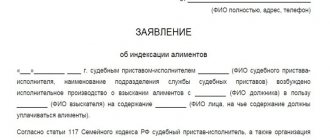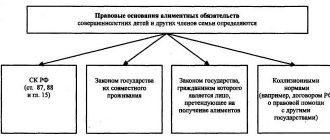Since not all individuals who have alimony obligations fulfill them properly, we suggest considering Article 113 of the Family Code. This legislative act describes in detail how arrears of alimony payments are established, as well as all additional details of this procedure.
Article 113 of the Family Code
If individuals come across such a term as alimony payments and want to clarify or find out something on this issue, then they need to open the Family Code of the Russian Federation (Chapter Thirteen).
In the event that the payer was ordered by the court to pay financial support to his child or another needy relative, or he himself agreed to this and signed an agreement, but for some reason did not actually allocate the money, he will need to calculate the debt to the recipient and repay it. This action must take place in accordance with the norms of Article 113 of the RF IC.
It should be noted that in case of violation of family law norms, including the provisions of article number 113, various fines or sanctions will be applied to an individual, then administrative liability, and then criminal liability (if the violator does not respond to requests regarding debt repayment) .
For what period is alimony debt calculated?
Regardless of what document regulates the procedure for withholding alimony from the income of a specific individual, the period for which the debt can be collected is the same. The first paragraph of Article 113 states that both on the basis of an agreement and on the basis of a writ of execution, the recipient has the right to demand repayment of alimony debt from the payer only for the last three years.
Let’s say the mother of an eight-year-old daughter provides for and raises her alone, divorced her husband five years ago and in the same year filed for child support through the court.
The husband, in turn, avoided making payments for all five years, and the recipient only on August 1, 2021 handed over the order issued to her in court to the bailiffs and asked to forcibly withhold the debt. In such a situation, the refund will not be made for the entire five years, but only for the time period from August 1, 2014 to August 1, 2021.
Is it possible to return the entire debt?
If you turn to the second paragraph of the same Article 113 for help, it becomes clear that the three-year period established as a temporary limit for withholding arrears of alimony payments does not always apply. It is also quite possible to receive all the money required by law for the payer, which was not provided to him, for the entire period of evasion. However, in order to do this, you must first prove that the benefits were not received precisely through the fault of the payer.
The way in which alimony was formalized - by agreement or by a court decision - does not matter. If the payer put his signature, thereby agreeing to fulfill the obligations specified in the contract, or the court independently established a list of obligations for him, then in the event of their violation, he not only must pay the debt, but will also be punished for deviation from the rules of documents that have legal force.
1. Collection of alimony for the past period on the basis of an agreement on the payment of alimony or on the basis of a writ of execution is carried out within the three-year period preceding the presentation of the writ of execution or a notarized agreement on the payment of alimony for collection. 2. In cases where the withholding of alimony on the basis of a writ of execution or on the basis of a notarized agreement on the payment of alimony was not made through the fault of the person obliged to pay alimony, alimony is collected for the entire period, regardless of the three-year period established by paragraph 2 of Article 107 of this Code. 3. The amount of debt is determined by the bailiff based on the amount of alimony determined by a court decision or an agreement on the payment of alimony. 4. The amount of arrears in alimony paid for minor children in accordance with Article 81 of this Code is determined based on the earnings and other income of the person obligated to pay alimony for the period during which alimony was not collected. In cases where the person obligated to pay alimony did not work during this period or if documents confirming his earnings and (or) other income are not presented, alimony arrears are determined based on the average salary in the Russian Federation at the time of collection of the debt. If such a determination of the debt significantly violates the interests of one of the parties, the party whose interests are violated has the right to go to court, which can determine the debt in a fixed amount of money based on the financial and family status of the parties and other noteworthy circumstances. 5. If you disagree with the determination of alimony debt by the bailiff, any of the parties may appeal the actions of the bailiff in the manner prescribed by civil procedural legislation. 6. The amounts of the monthly child benefit established by federal law, paid during the search for his parents who are evading payment of alimony, in part of their fifty percent increase, are recovered from these parents with an accrual of ten percent of the paid amounts to the income of the budgets of the constituent entities of the Russian Federation. These requirements are equivalent to demands for payment of alimony.
Commentary on Article 113. 1. Collection of alimony arrears should be distinguished from collection of alimony for the past period, provided for in Part 2, Clause 2, Article 107 of the Insurance Code (see commentary to it). Debt arises in cases where the parties entered into an agreement to pay alimony or the court made a decision to collect alimony, but in fact the payment of alimony was not made according to these documents. Collection of alimony for the past period, provided for in Part 2, Clause 2, Article 107 of the Family Code, occurs when a person had the right to alimony in accordance with Chapter 13, 14 or 15 of the Family Code, but the parties did not enter into an agreement on the payment of alimony, and the person , who has the right to them, did not go to court with a claim for the recovery of alimony. Consequently, when collecting a debt, we are talking about the payment of amounts payable on the basis of an agreement of the parties or a court decision, and when collecting alimony for the past period in accordance with Part 2, Clause 2, Article 107 of the Insurance Code - about the payment of amounts for the period preceding the appeal to court. 2. Debt can occur for various reasons. It can arise either as a result of the debtor’s guilty actions - evasion of paying alimony, or due to the fault of the alimony recipient, for example, in the case of failure to present a writ of execution or a notarized agreement for collection, failure to report a change of place of residence, refusal to receive alimony, etc. d. Debt may also arise due to circumstances beyond the control of the parties: due to illness of the payer, lack of funds to pay alimony, insolvency of the enterprise where the debtor works, delay in payment of wages, location of one of the parties in a territory where martial law or a state of emergency has been declared , in the territory of military operations, etc. Repayment of a debt can put the person paying alimony in a very difficult situation, therefore the period within which the debt must be repaid is limited to three years immediately preceding the presentation of a writ of execution or a notarized agreement for collection. If the formation of the debt was due to the fault of the debtor, the debt is collected for the entire period during which alimony was not paid, regardless of the three-year period. Previously existing legislation (Part 2 of Article 96 of the Code of Criminal Law) provided for the possibility of collecting debt for the entire period of its formation only when it arose in connection with the search for the debtor announced by the internal affairs bodies. Current legislation allows such collection in any cases where the debt arose through the fault of the debtor, regardless of whether he was wanted or not. The guilty behavior of the debtor, which led to the formation of debt, can also be expressed in his concealment of his income or other property, failure to report a change in place of work or residence, and other actions that impede the collection of alimony. Compensation by a person obligated to pay alimony for the resulting debt does not exempt him from paying the penalty and compensation for losses provided for in Article 115 of the Family Code. 3. The amount of debt is determined by the bailiff by multiplying the amount of alimony collected in a fixed amount by the number of periods during which alimony was payable, but was not actually paid. For example, if the obligated person had to pay 100 thousand rubles. per month and alimony was not paid for 11 months, the amount of debt will be 1 million 100 thousand rubles. When determining the amount of debt, the bailiff is obliged to index alimony payments in accordance with Article 117 of the Family Code (see commentary to it). For example, alimony was awarded in the amount of 1/2 the minimum wage. At the time of the court decision it was 100 thousand rubles. Child support was not paid for 11 months. After 6 months after the court decision, the minimum wage was increased and amounted to 150 thousand rubles. Debt is calculated as follows. In the first 6 months, the obligated person had to pay alimony in the amount of 50 thousand rubles. per month (1/2 of 100 thousand rubles). The debt for this period amounted to 300 thousand rubles. (50 thousand x 6 = 300 thousand). Over the next 7 months, the payer had to pay 75 thousand rubles. per month (1/2 of 150 thousand rubles). The debt for this period amounted to 525 thousand (75 thousand x 7 = 525 thousand). The total debt for 11 months is 825 thousand rubles. (300 thousand + 525 thousand). 4. When determining arrears in the payment of alimony for minor children by their parents on the basis of Article 81 of the Criminal Code, in order to determine the arrears, the bailiff must obtain information about the wages and other income of the alimony payer during this period and, based on these data, calculate the amount of alimony to be paid during the period of debt formation. Failure to provide the bailiff with documents confirming earnings or income upon request is considered as evasion of alimony payment. Determining debt based on the average salary in the Russian Federation at the time of debt formation, if the debtor did not work during the period of debt formation or documents confirming his earnings or other income were not submitted, is intended to provide protection for both the recipient and the alimony payer. In different regions of the Russian Federation, the level of income of the population varies greatly, and therefore the collection of alimony based on the average salary in the area in which the parent paying alimony lives, or in the area in which the child lives, would lead to a violation of the interests of either the parent or child. Using the average wage level in the Russian Federation is intended to smooth out existing regional differences. In some cases, for example, if the parent paying alimony did not work for a good reason during the period of debt formation and therefore did not receive income, determining the debt based on the average salary in the Russian Federation can significantly violate his rights. If, on the contrary, there is evidence that the level of his income significantly exceeded the average salary in the Russian Federation, but it is not possible to collect documents confirming his monthly income, determining the debt in this way does not meet the interests of the child. In such situations, either party has the right to file a claim in court to determine the debt in a fixed amount of money. The court, taking into account all the specific circumstances of the case, determines the debt based on the financial and family status of the parties and other noteworthy circumstances, guided by the rules of paragraph 2 of Article 83 of the IC (see paragraph 2 of Article 83 of the IC and the commentary thereto). 5. In accordance with Part 2 of Article 17 of the Federal Law “On State Benefits for Citizens with Children,” the amount of the monthly benefit for a child whose parents evade paying child support increases by 50%. When collecting debt from parents who evade paying alimony, amounts paid to the child during the period when alimony was not paid, in the amount of 50% of the benefit provided for in Article 17 of the said Federal Law, are deducted from the amount of the debt and are not paid to the claimant. For example, the benefit amount was 50 thousand rubles. per month; on the basis of Article 17 of the said Law, it was increased by 25 thousand rubles. per month. Child support was not paid for 10 months. The amount of debt was calculated in the amount of 500 thousand rubles. The amount of the 50% increase in benefits paid for this period amounted to 250 thousand rubles. (25 thousand rubles x 10 = 250 thousand rubles). The amount of the 50% increase in benefits paid is deducted from the amount of debt: 500 thousand rubles. — 250 thousand rubles. = 250 thousand rubles. The amount that was paid for the child in the form of a 50% increase in benefits is subject to recovery from the alimony payer into the budget of the corresponding constituent entity of the Russian Federation with an addition of 10% to the amount payable. This measure is intended to compensate for the budget costs of paying child benefits in an increased amount and to encourage the payer to pay child support on time. The claimant in the above example is paid a debt in the amount of 250 thousand rubles, since the remaining amount of alimony is in the amount of 250 thousand rubles. he had already received in the form of a 50% increase in child benefit. Otherwise, the claimant would have received the specified amount twice: once in the form of the specified increase in child support and a second time in the form of arrears in alimony, which would have led to his unjust enrichment.
How is the amount of debt determined?
The third and fourth paragraphs of Article 113 of the RF IC are devoted to the amount of alimony debt. Such a procedure as determining this amount is the responsibility of the bailiff, whose decision must be based on the amount of alimony payments previously established either by the relevant order or by agreement. As for the amount of debt for child support compensation, the fourth paragraph of this law contains answers to the following questions:
- What is the general rule for determining child support debt? If it was decided to withhold alimony compensation from the income of an individual for the maintenance of his minor children and this procedure is carried out in accordance with Article 81 of the RF IC, then in the event of non-payment of material resources, the amount of the debt will be determined based on the amount of the payer’s earnings, including all additional income. The violator will be obliged to compensate the debt for the entire time during which he violated his direct obligations.
- How to calculate debt if the payer is unemployed? It may happen that the payer did not provide cash benefits to the child because he did not work and could not even provide for himself at the moment. In such a situation, the parent is still obliged to pay the minor child money for the entire period during which they were not received. The amount of debt will then be calculated based on the average salary in force in the Russian Federation at the time of deduction.
- What to do if the approved amount of debt does not satisfy the interests of one of the parties? It often happens that the amount of debt, which was determined based on the size of the average monthly earnings, is contrary to the interests of the recipient or payer. Then an individual who does not agree with the assigned amount must go to court and demand that alimony be calculated in the form of a fixed sum of money. The judge will take into account the level of income of both persons, as well as additional factors worthy of attention, and will try as much as possible to meet the needs of the child when making a decision.
Attention! Let's say the recipient contacted the bailiff service and wants to reimburse the money that was not transferred as alimony for the child, but in order to establish the amount of the debt, he does not have any documents indicating the level of income of the payer (for example, certificate 2 -NDFL). Then the amount of this compensation will be calculated based on the average earnings among Russian citizens.
Article 113 of the RF IC. Determination of alimony debt (current version)
1. Alimony arrears arise in cases where the parties entered into an agreement to pay alimony or a judicial act was issued to collect alimony, but alimony was not actually paid according to these documents.
The formation of debt can occur for various reasons, both as a result of the guilty actions of the debtor (evasion from paying alimony), and through the fault of the recipient of alimony, for example, in the case of failure to present a writ of execution for collection, failure to report a change of residence, refusal to receive alimony .
Debt may also arise due to circumstances beyond the control of the parties: due to illness of the person obligated to pay alimony, due to his lack of funds to pay alimony, insolvency of the enterprise where the debtor works, delay in payment of wages, presence of one of the parties in the territory where a state of war or emergency has been declared, in the territory of military operations, etc.
If the debtor ignores the court’s decision to pay alimony, then the bailiff has the right to temporarily restrict the debtor’s travel abroad (Article 67 of Federal Law No. 229-FZ of October 2, 2007 “On Enforcement Proceedings”). According to this article, if a debtor-citizen or a debtor who is an individual entrepreneur fails to fulfill, within the period established for voluntary execution, without good reason, the requirements contained in a writ of execution, the amount of debt for which exceeds ten thousand rubles, or a writ of execution of a non-property nature, issued on the basis of a judicial act or being a judicial act, the bailiff has the right, at the request of the claimant or on his own initiative, to issue a resolution on a temporary restriction on the debtor’s departure from the Russian Federation. To do this, a copy of the resolution restricting exit from the country is sent to the border control authorities. The register of persons temporarily prohibited from traveling outside Russia is updated weekly.
Paragraph 1 of the commented article states that alimony for the past period on the basis of an agreement on the payment of alimony or on the basis of a writ of execution can be collected only within the three-year period preceding the presentation of the writ of execution or a notarized agreement on the payment of alimony for collection.
2. In paragraph 2 of the commented article, a rule is established according to which, if the payer is to blame for the formation of arrears in the payment of alimony, then it is recovered for the entire period during which alimony was not paid. Accordingly, the rule provided for in paragraph 2 of Art. 107 (see commentary to it), the three-year period for which alimony will be collected will not apply.
3. Calculating the amount of debt is the responsibility of the bailiff, who determines it based on the amount of alimony determined by a court decision or agreement on the payment of alimony: the established amount of alimony is multiplied by the number of months (periods) during which no payments were made. In this case, the rule established by Art. 117 of the RF IC, on the indexation of alimony payments in proportion to the increase in the minimum wage.
4. In paragraph 4 of the commented article, reference is made to Art. 81 of the IC (see commentary to it), which established the amount of alimony collected from minor children in court. In such cases, the alimony payer who has incurred arrears in paying alimony to minor children must provide the bailiff with documents confirming information about the salary and other income of the alimony payer during this period, and on the basis of these data the latter calculates the amount of alimony to be paid during the period of debt formation. In the absence of earnings or other income, as well as documents confirming his earnings and (or) other income, alimony arrears are determined based on the average salary in the Russian Federation at the time of debt collection.
It is quite possible that such a procedure for collecting alimony will significantly violate the interests of either the payer or the recipient of alimony. This, in particular, is possible due to the fact that the average salary in the Russian Federation at the time of debt collection may not correspond to regional characteristics (for example, Chukotka is considered the most expensive region). Therefore, the commented paragraph secures the right of the party whose interests have been violated to file a claim in court to determine the amount of debt in a fixed amount of money, based on the financial and family status of the parties and other noteworthy circumstances.
Failure to provide the bailiff with documents confirming earnings or income upon request is considered as evasion of alimony payment.
5. If the payer or recipient of alimony does not agree with the amount of alimony debt calculated by the bailiff, they can appeal the actions of the bailiff in the manner prescribed by civil procedural legislation.
In particular, this can be done both administratively and judicially. Thus, the administrative appeal procedure is established by Ch. 18 of the Law on Enforcement Proceedings. According to Art. 122 of this Law, a complaint against a decision of an official of the bailiff service, his actions (inaction) is filed within ten days from the date the bailiff or other official issued a decision, committed an action, established the fact of his inaction or refused to challenge. A person who was not notified of the time and place of action shall file a complaint within ten days from the day when this person learned or should have known about the adoption of a decision or the commission of actions (inaction).
6. In cases where the payer evades payment of alimony, he may be put on the wanted list. In such cases, alimony is not paid, but the child is paid an increased child benefit.
Paragraph 6 of the commented article refers to cases of evasion of alimony by the payer, in which the monthly child benefit (paid during the search for his parents) increases by 50%. The bailiff collects the specified funds - 50% of the amount of the monthly benefit from the debtor into the budget of the corresponding subject of the Federation, having previously charged 10%, which can be considered as a fine.
According to Art. 16 Federal Law of May 19, 1995 “On state benefits for citizens with children” the amount, procedure for assigning, indexing and paying child benefits, including the conditions and frequency of its payment (at least once a quarter), including the application of criteria need are established by laws and other regulatory legal acts of the constituent entity of the Russian Federation.
In this case, the collection of the amounts specified in paragraph 6 of the commented article is carried out in the order of writ proceedings in accordance with paragraph. 5 tbsp. 122 Code of Civil Procedure of the Russian Federation. According to this paragraph, a court order is issued if a demand is made for the collection of alimony for minor children, not related to establishing paternity, challenging paternity (maternity) or the need to involve other interested parties.
Comment source:
“ARTICLE-BY-ARTICLE COMMENTARY TO THE FAMILY CODE OF THE RUSSIAN FEDERATION” UPDATED
S.P. Grishaev, 2017
Responsibility for violation of alimony obligations
Most parents who do not transfer funds to their children in a timely manner mistakenly believe that after a while they will be able to compensate the entire amount of the debt with one payment and, accordingly, atone for their guilt towards the child. However, this is a fundamentally erroneous opinion.
In the best case, if the parent does not delay too long in providing payments, he will be forced to pay a fine and, of course, pay off the child support debt. Sometimes various types of sanctions may be applied (for example, a ban on leaving the country or using government services).
In the worst case, if the parent, from whose earnings alimony must be collected, does not respond for quite a long time to the requests of the second parent to repay the debt, does not respond to subpoenas from the court, then after the application of penalties in the form of fines and sanctions, more severe measures will be imposed. This can be either correctional labor or complete imprisonment. But even if an individual incurs criminal liability, this does not mean that it is not necessary to return the alimony compensation required by law to your child.
If the payer did not allocate financial support for the child due to the fact that the last minor individual became able to work prematurely (married or registered as a private entrepreneur), then he is not considered a debtor and will not suffer any punishment.
Comments on the article
Alimony arrears arise in cases where the parties entered into an agreement to pay alimony or a judicial act was issued to collect alimony, but alimony was not actually paid according to these documents.
The formation of debt can occur for various reasons, both as a result of the guilty actions of the debtor (evasion from paying alimony), and through the fault of the recipient of alimony, for example, in the case of failure to present a writ of execution for collection, failure to report a change of residence, refusal to receive alimony.
Debt may also arise due to circumstances beyond the control of the parties: due to illness of the person obligated to pay alimony, due to his lack of funds to pay alimony, insolvency of the enterprise where the debtor works, delay in payment of wages, presence of one of the parties in the territory where a state of war or emergency has been declared, in the territory of military operations, etc.
If the debtor ignores the court’s decision to pay alimony, then the bailiff has the right to temporarily restrict the debtor’s travel abroad (Article of the Federal Law of October 2, 2007 N 229-FZ “On Enforcement Proceedings”). To do this, a copy of the resolution restricting exit from the country is sent to the border control authorities. The register of persons temporarily prohibited from traveling outside Russia is updated weekly.
Paragraph 1 of the commented article states that alimony for the past period upon the issuance of an agreement on the payment of alimony or on the issuance of a writ of execution can be recovered within the three-year period preceding the presentation of the writ of execution or a notarized agreement on the payment of alimony for collection.
Paragraph 2 of the commented article establishes a rule according to which, if the payer is to blame for the formation of arrears in the payment of alimony, then it is collected for the entire period during which alimony was not paid.
Calculating the amount of debt is the responsibility of the bailiff, who determines it based on the amount of alimony determined by a court decision or agreement on the payment of alimony: the established amount of alimony is multiplied by the number of months (periods) during which no payments were made. In this case, the rule established by Art. 117 of the RF IC, on the indexation of alimony payments in proportion to the increase in the minimum wage.
In paragraph 4 of the commented article, reference is made to Art. IC (see commentary to it), which established the amount of alimony collected from minor children in court. In such cases, the alimony payer, who has incurred arrears in paying alimony to minor children, must provide the bailiff with documents confirming information about the salary and other income of the alimony payer during this period, and based on this data, the latter calculates the amount of alimony to be paid during the period of debt formation. In the absence of earnings or other income, as well as documents confirming his earnings and (or) other income, alimony arrears are determined based on the average salary in the Russian Federation at the time of debt collection.
It is quite possible that such a procedure for collecting alimony will significantly violate the interests of either the payer or the recipient of alimony. This, in particular, is possible due to the fact that the average salary in the Russian Federation at the time of debt collection may not correspond to regional characteristics (for example, Chukotka is considered the most expensive region). Therefore, the commented paragraph secures the right of the party whose interests have been violated to file a claim in court to determine the amount of debt in a fixed amount of money, based on the financial and marital status of the parties and other noteworthy circumstances.
Failure to provide the bailiff with documents confirming earnings or income upon request is considered as evasion of alimony payment.
If the payer or recipient of alimony does not agree with the amount of alimony debt calculated by the bailiff, they can appeal the actions of the bailiff in the manner prescribed by civil procedural legislation.
In particular, this can be done both administratively and judicially. Thus, the administrative appeal procedure is established by Ch. 18 of the Law on Enforcement Proceedings. Agreed Art. 122 of this Law, a complaint against a decision of an official of the bailiff service, his actions (inaction) is filed within ten days from the date the bailiff or other official issued a decision, committed an action, established the fact of his inaction or refused to challenge. A person who was not notified of the time and place of action shall file a complaint within ten days from the day when this person learned or should have known about the adoption of a decision or the commission of actions (inaction).
In cases where the payer evades payment of alimony, he may be put on the wanted list. In such cases, no alimony is paid, but the child is paid an increased child benefit.
Paragraph 6 of the commented article refers to cases of evasion of alimony by the payer, in which the monthly child benefit (paid during the search for his parents) increases by 50%. The bailiff collects the specified funds - 50% of the amount of the monthly benefit from the debtor into the budget of the corresponding subject of the Federation, having previously charged 10%, which can be considered as a fine.
Agreed Art. Federal Law of May 19, 1995 “On state benefits for citizens with children”, the amount, procedure for assigning, indexing and paying monthly child benefits is established by laws and other regulatory legal acts of the constituent entity of the Russian Federation.
In this case, the collection of the amounts specified in paragraph 6 of the commented article is carried out in the order of writ proceedings in accordance with paragraph. 5 tbsp. 122 Code of Civil Procedure of the Russian Federation. In accordance with the specified paragraph, a court order is issued if a demand is made for the collection of alimony for minor children, not related to establishing paternity, challenging paternity (maternity) or the need to involve other interested parties.
Article 113. “Family Code of the Russian Federation” dated December 29, 1995 N 223-FZ (as amended on February 4, 2021, as amended on March 2, 2021)
1. Alimony arrears arise in cases where the parties entered into an agreement to pay alimony or a judicial act was issued to collect alimony, but alimony was not actually paid according to these documents.
The formation of debt can occur for various reasons, both as a result of the guilty actions of the debtor (evasion from paying alimony), and through the fault of the recipient of alimony, for example, in the case of failure to present a writ of execution for collection, failure to report a change of residence, refusal to receive alimony .
Debt may also arise due to circumstances beyond the control of the parties: due to illness of the person obligated to pay alimony, due to his lack of funds to pay alimony, insolvency of the enterprise where the debtor works, delay in payment of wages, presence of one of the parties in the territory where a state of war or emergency has been declared, in the territory of military operations, etc.
If the debtor ignores the court’s decision to pay alimony, then the bailiff has the right to temporarily restrict the debtor’s travel abroad (Article 67 of Federal Law No. 229-FZ of October 2, 2007 “On Enforcement Proceedings”). According to this article, if a debtor-citizen or a debtor who is an individual entrepreneur fails to fulfill, within the period established for voluntary execution, without good reason, the requirements contained in a writ of execution, the amount of debt for which exceeds ten thousand rubles, or a writ of execution of a non-property nature, issued on the basis of a judicial act or being a judicial act, the bailiff has the right, at the request of the claimant or on his own initiative, to issue a resolution on a temporary restriction on the debtor’s departure from the Russian Federation. To do this, a copy of the resolution restricting exit from the country is sent to the border control authorities. The register of persons temporarily prohibited from traveling outside Russia is updated weekly.
Paragraph 1 of the commented article states that alimony for the past period on the basis of an agreement on the payment of alimony or on the basis of a writ of execution can be collected only within the three-year period preceding the presentation of the writ of execution or a notarized agreement on the payment of alimony for collection.
2. In paragraph 2 of the commented article, a rule is established according to which, if the payer is to blame for the formation of arrears in the payment of alimony, then it is recovered for the entire period during which alimony was not paid. Accordingly, the rule provided for in paragraph 2 of Art. 107 (see commentary to it), the three-year period for which alimony will be collected will not apply.
3. Calculating the amount of debt is the responsibility of the bailiff, who determines it based on the amount of alimony determined by a court decision or agreement on the payment of alimony: the established amount of alimony is multiplied by the number of months (periods) during which no payments were made. In this case, the rule established by Art. 117 of the RF IC, on the indexation of alimony payments in proportion to the increase in the minimum wage.
4. In paragraph 4 of the commented article, reference is made to Art. 81 of the IC (see commentary to it), which established the amount of alimony collected from minor children in court. In such cases, the alimony payer who has incurred arrears in paying alimony to minor children must provide the bailiff with documents confirming information about the salary and other income of the alimony payer during this period, and on the basis of these data the latter calculates the amount of alimony to be paid during the period of debt formation. In the absence of earnings or other income, as well as documents confirming his earnings and (or) other income, alimony arrears are determined based on the average salary in the Russian Federation at the time of debt collection.
It is quite possible that such a procedure for collecting alimony will significantly violate the interests of either the payer or the recipient of alimony. This, in particular, is possible due to the fact that the average salary in the Russian Federation at the time of debt collection may not correspond to regional characteristics (for example, Chukotka is considered the most expensive region). Therefore, the commented paragraph secures the right of the party whose interests have been violated to file a claim in court to determine the amount of debt in a fixed amount of money, based on the financial and family status of the parties and other noteworthy circumstances.
Failure to provide the bailiff with documents confirming earnings or income upon request is considered as evasion of alimony payment.
5. If the payer or recipient of alimony does not agree with the amount of alimony debt calculated by the bailiff, they can appeal the actions of the bailiff in the manner prescribed by civil procedural legislation.
In particular, this can be done both administratively and judicially. Thus, the administrative appeal procedure is established by Ch. 18 of the Law on Enforcement Proceedings. According to Art. 122 of this Law, a complaint against a decision of an official of the bailiff service, his actions (inaction) is filed within ten days from the date the bailiff or other official issued a decision, committed an action, established the fact of his inaction or refused to challenge. A person who was not notified of the time and place of action shall file a complaint within ten days from the day when this person learned or should have known about the adoption of a decision or the commission of actions (inaction).
6. In cases where the payer evades payment of alimony, he may be put on the wanted list. In such cases, alimony is not paid, but the child is paid an increased child benefit.
Paragraph 6 of the commented article refers to cases of evasion of alimony by the payer, in which the monthly child benefit (paid during the search for his parents) increases by 50%. The bailiff collects the specified funds - 50% of the amount of the monthly benefit from the debtor into the budget of the corresponding subject of the Federation, having previously charged 10%, which can be considered as a fine.
According to Art. 16 Federal Law of May 19, 1995 “On state benefits for citizens with children” the amount, procedure for assigning, indexing and paying child benefits, including the conditions and frequency of its payment (at least once a quarter), including the application of criteria need are established by laws and other regulatory legal acts of the constituent entity of the Russian Federation.
In this case, the collection of the amounts specified in paragraph 6 of the commented article is carried out in the order of writ proceedings in accordance with paragraph. 5 tbsp. 122 Code of Civil Procedure of the Russian Federation. According to this paragraph, a court order is issued if a demand is made for the collection of alimony for minor children, not related to establishing paternity, challenging paternity (maternity) or the need to involve other interested parties.
S.P. Grishaev
“ARTICLE-BY-ARTICLE COMMENTARY TO THE FAMILY CODE OF THE RUSSIAN FEDERATION”
2017









